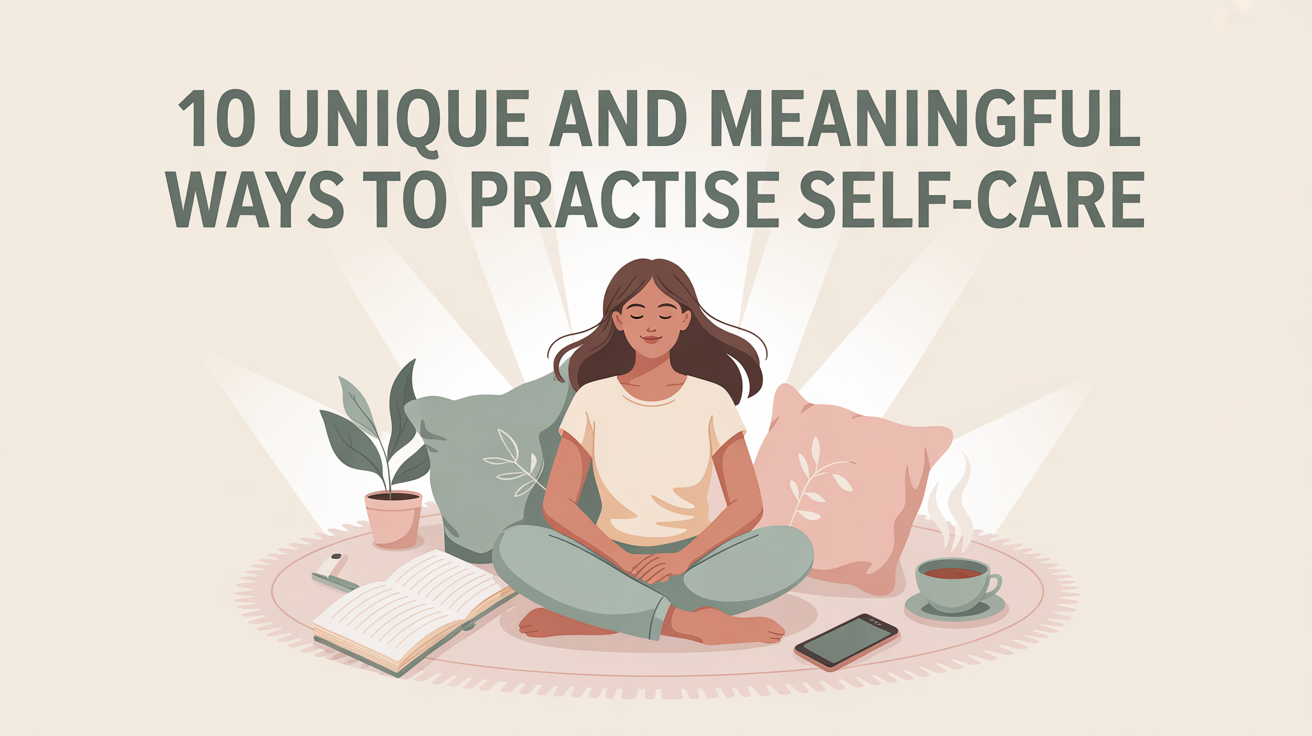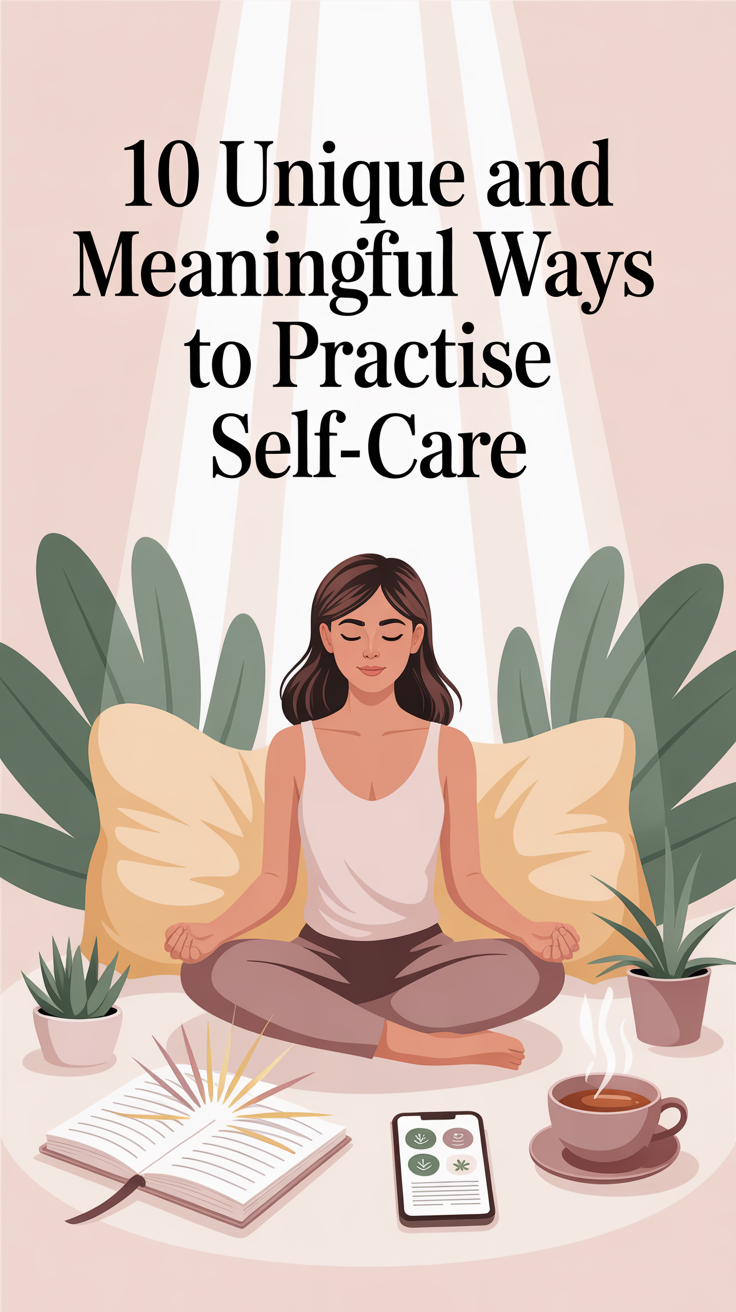10 Unique and Meaningful Ways to Practice Self-Care (That Actually Work)
Look, I know what you’re thinking when you hear “self-care.” Bubble baths, face masks, maybe some scented candles, right?
Don’t get me wrong — those things are nice. But real self-care? It goes so much deeper than that. And here’s the best part: the most meaningful ways to take care of yourself don’t cost a fortune.
I used to think I needed expensive spa days or retail therapy to recharge. Then I realized I was just avoiding the real issue — I wasn’t actually taking care of my mental, emotional, and physical needs in ways that mattered.
So today, I’m sharing 10 unique and genuinely meaningful ways to practice self-care. These aren’t your typical Instagram-worthy suggestions. These are the practices that have honestly changed my life — and they can change yours too.
1. Set Boundaries (And Actually Stick to Them)
This one’s huge, and I’ll admit — it’s the hardest for me.
Real self-care means saying “no” to things that drain you. That work project that’ll eat up your entire weekend? That friend who only calls when they need something? That family obligation that leaves you exhausted?
Here’s how to start:
- Pick ONE boundary you need to set this week
- Write down exactly what you’ll say when you need to enforce it
- Practice saying “I can’t commit to that right now” without over-explaining
You don’t owe anyone a 10-minute justification for taking care of yourself. A simple “I need to protect my time right now” is enough.
Even setting just one boundary can free up hours of your week and tons of mental energy. That’s time and peace you get back for free.
2. Have a “Device-Free Hour” Every Evening
I know, I know. You need your phone. We all do.
But here’s what I discovered: spending just one hour without screens before bed completely changed my sleep quality and my mood.
No scrolling through social media comparing yourself to others. No doomscrolling news. No work emails. Just… quiet.
Try this tonight:
- Set an alarm for 8 PM (or whatever works for you)
- Put your phone in another room — seriously, out of sight
- Read, journal, stretch, or just sit and think
- Notice how much calmer you feel
I was skeptical at first, but after one week, I was sleeping better and waking up less anxious. And it didn’t cost me a single cent.
3. Create a “Not-To-Do” List
We’re obsessed with to-do lists. But what about a list of things you’re intentionally not going to do?
This sounds weird, but it’s incredibly freeing. Mine includes things like:
- Not checking work email after 6 PM
- Not scrolling social media in the morning
- Not attending events out of guilt
- Not buying things just because they’re on sale
Your turn:
- Write down 5 things you’re going to stop doing
- Put it somewhere visible
- Every time you avoid one of these things, celebrate it as a win
This practice helps you recognize that rest and boundaries aren’t laziness — they’re choices you’re making to protect your wellbeing.
4. Move Your Body in a Way You Actually Enjoy
Exercise as self-care? Hear me out.
I’m not talking about punishing gym sessions or forcing yourself to run if you hate running. I’m talking about moving your body in ways that feel good and joyful.
For me, it’s dancing in my kitchen while making dinner. For you, it might be:
- Walking while listening to your favorite podcast
- Gentle stretching in your living room
- Playing tag with your kids
- Gardening
- Taking the stairs and actually enjoying the climb
Movement releases endorphins, reduces stress, and helps you reconnect with your body. And when you find movement you genuinely enjoy? It stops feeling like a chore and starts feeling like freedom.
The best part? Most of these cost absolutely nothing.
5. Schedule “Worry Time” (Yes, Really)
This one sounds counterintuitive, but stick with me.
Instead of letting anxious thoughts interrupt your entire day, give them a designated time slot.
Here’s what changed for me: I set aside 15 minutes every evening at 7 PM as my official “worry time.” When anxious thoughts pop up during the day, I tell myself, “I’ll think about that at 7 PM.”
How to do it:
- Choose a specific 15-20 minute window each day
- When worries come up earlier, write them down and save them for worry time
- During worry time, let yourself fully engage with those concerns
- When the timer goes off, you’re done until tomorrow
It sounds silly, but it actually works. You’re training your brain that it doesn’t need to worry constantly — there’s a time and place for it.
6. Practice “Micro-Joys” Throughout Your Day
Self-care isn’t just about big moments. It’s about sprinkling tiny bits of joy throughout your regular day.
I started noticing small things that made me smile and intentionally doing more of them:
- Making my coffee in my favorite mug
- Opening the window to hear birds
- Lighting a candle during lunch
- Taking three deep breaths between tasks
- Texting a friend a funny meme
Your challenge this week:
- Notice 3 tiny things that bring you joy each day
- Write them down
- Intentionally add one extra micro-joy to tomorrow
These small moments add up to a completely different emotional experience of your day. And they’re free, quick, and accessible no matter how busy you are.
7. Clean Out One Space That Stresses You Out
I resisted this for the longest time because cleaning doesn’t feel like “self-care.” But trust me on this one.
Your environment affects your mental state more than you realize.
That junk drawer that’s been bothering you for months? That overflowing email inbox? That closet where everything falls out when you open it? Each one is creating low-level stress every single time you see it.
Pick just ONE. Spend 20 minutes on it this weekend.
Why this works:
- You eliminate a daily source of stress
- You get an immediate sense of accomplishment
- You create a calmer space for yourself to exist in
I cleared out my email inbox last month (deleted over 2,000 emails!) and the mental relief was instant. It took 45 minutes and cost nothing, but I felt lighter for weeks.
8. Have Real Conversations (Not Just Small Talk)
When’s the last time you had a conversation that left you feeling energized instead of drained?
Real connection is self-care. Not surface-level “how are you” exchanges — I mean actual, meaningful conversations where you feel seen and heard.
Try this:
- Call (not text!) one friend this week
- Ask them something real: “What’s been on your mind lately?” or “What’s something you’re excited about?”
- Share something honest about your own life
- Listen without trying to fix or advise
I started doing this monthly with a few close friends, and it’s become one of my favorite self-care practices. It reminds me I’m not alone and that connection doesn’t require expensive dinners out — just intentional time.
9. Give Yourself Permission to Rest Without Earning It
This is the one I still struggle with the most.
We’ve been conditioned to believe we have to earn rest. Work hard, then you can relax. Be productive, then you deserve a break.
But here’s the truth: You don’t have to earn the right to rest. You’re a human being, not a machine.
Rest is not a reward. It’s a basic need, like food and water.
Practice this:
- Rest when you’re tired, not just when you’re done
- Take breaks before you hit burnout
- Say “I’m resting because I need to” instead of “I’m resting because I finished my work”
The first time I let myself take a nap on a Saturday afternoon without feeling guilty? Game changer. I woke up refreshed instead of resentful, and I hadn’t spent a dime.
10. Create a “Joy Jar” for Hard Days
On good days, we forget that hard days are coming. And on hard days, we can’t remember that good days exist.
That’s where a joy jar comes in.
Here’s what you do:
- Get any container (jar, box, envelope — doesn’t matter)
- Throughout the month, write down good moments on small pieces of paper: a compliment you received, a beautiful sunset, a moment you laughed really hard, a problem you solved
- On hard days, pull out a few notes and read them
I started doing this six months ago, and now I have over 100 little reminders that life has beautiful moments even when things feel heavy.
Cost: $0. Impact: Priceless.
The Bottom Line
Real self-care isn’t about what you buy or how much you spend. It’s about making intentional choices to protect your peace, energy, and wellbeing.
You don’t need a spa membership or expensive products. You just need to start paying attention to what truly fills your cup — and then doing more of that.
Pick just one practice from this list and try it this week. Just one. You don’t have to overhaul your entire life overnight.
Small, meaningful changes add up. And you’re worth taking care of — not someday, but right now.
What’s one way you’re going to practice self-care this week? I’d love to hear about it.




